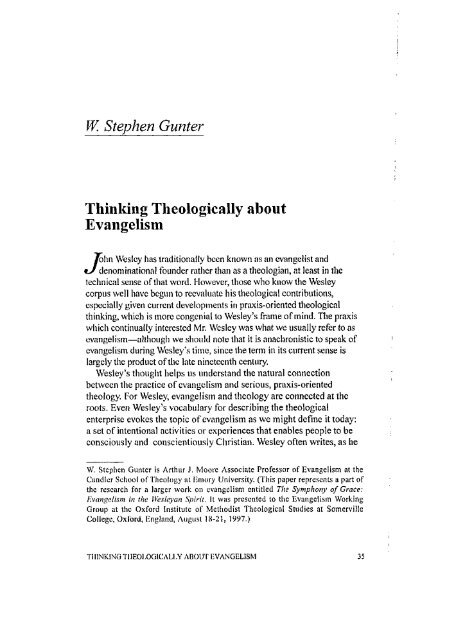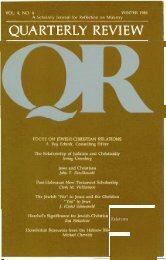Spring 1999 - Quarterly Review
Spring 1999 - Quarterly Review
Spring 1999 - Quarterly Review
You also want an ePaper? Increase the reach of your titles
YUMPU automatically turns print PDFs into web optimized ePapers that Google loves.
1W. Stephen GunterThinking Theologically aboutEvangelismJohn Wesley has traditionally been known as an evangelist and*J denominational founder rather than as a theologian, at least in thetechnical sense of that word. However, those who know the Wesleycorpus well have begun to reevaluate his theological contributions,especially given current developments in praxis-oriented theologicalthinking, which is more congenial to Wesley's frame of mind. The praxiswhich continually interested Mr. Wesley was what we usually refer to asevangelism—although we should note that it is anachronistic to speak ofevangelism during Wesley's time, since the term in its current sense islargely the product of the late nineteenth century.Wesley's thought helps us understand the natural connectionbetween the practice of evangelism and serious, praxis-orientedtheology. For Wesley, evangelism and theology are connected at theroots. Even Wesley's vocabulary for describing the theologicalenterprise evokes the topic of evangelism as we might define it today:a set of intentional activities or experiences that enables people to beconsciously and conscientiously Christian. Wesley often writes, as heW. Stephen Gunter is Arthur J. Moore Associate Professor of Evangelism at theCandler School of Theology at Emory University. (This paper represents a part ofthe research for a larger work on evangelism entitled The Symphony of Grace:Evangelism in the Wesleyan Spirit. It was presented to the Evangelism WorkingGroup at the Oxford Institute of Methodist Theological Studies at SomervilleCollege, Oxford, England, August 18-21, 1997.)THINKING THEOLOGICALLY ABOUT EVANGELISM 35












